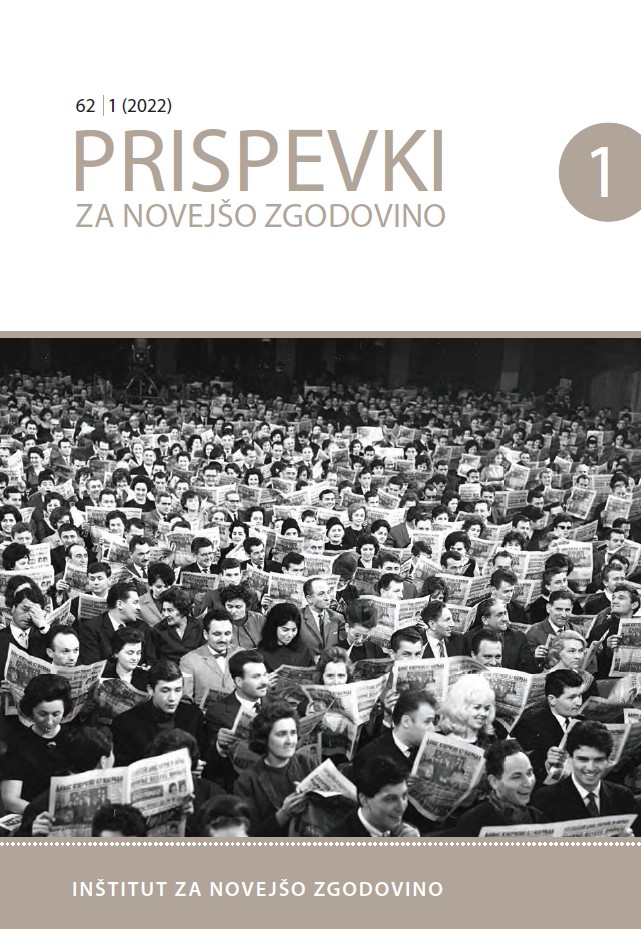Remembering Tanjug
Analysing re-articulation of journalistic roles at the national news agency of socialist Yugoslavia
DOI:
https://doi.org/10.51663/pnz.62.1.5Keywords:
journalistic roles, occupational life histories, interviews, Tanjug, YugoslaviaAbstract
Historically, the role of journalism in society is bound to the prevailing conceptualization of the freedom of the press, specific societal, institutional, and material conditions of news production. This study explores self-perceptions of journalists working in the period of socialist Yugoslavia and synthetizes their recollections of journalistic orientations and performances with respect to journalism’s place in society. The study is based on the oral history interviews with former journalists, who worked also as editors and foreign correspondents from late 1950s to 1990s at the news agency Tanjug, which was considered the information backbone of the federal media system in Yugoslavia and had considerable international relevance. By combining ‘journalistic roles’ studies as well as ‘occupational life history’ research this historical study makes twofold contribution. First, it identifies adaptive strategies of remembering used by the interviewed journalists to legitimize themselves as professionals and relevant interpreters of SFRY journalism. Second, it reveals more nuances within common, often simplified understandings of journalists as collaborators with power during socialism, and highlights roles of privileged disseminator, monitoring analyst, and educator as specific manifestations of collaborative function of journalism.
References
Banks, Miranda J. “Oral History and Media Industries.” Cultural Studies 28, No. 4 (March 2014): 545–60.
Conway, Mike. “Oral History Interviews.” The International Encyclopedia of Media Studies, (December 2013): 155–78. John Wiley & Sons. Available at: https://doi.org/10.1002/9781444361506.wbiems177.
Gorjup, Mitja. “Ponuditi moramo svetu nov tip informiranja.” In: Mitja Gorjup: Samoupravno novinarstvo (Izbor govorov in člankov). Ed. Vlado Jarc, 59–66. Ljubljana: Delavska enotnost, 1975/1978.
Gorjup, Mitja. “Jugoslovanska “šola” novinarstva.” In: Mitja Gorjup: Samoupravno novinarstvo (Izbor govorov in člankov). Ed. Vlado Jarc, 56–57. Ljubljana: Delavska enotnost, 1975/1978.
Hanitzsch, Thomas. “Journalistic Roles.” In: The International Encyclopedia of Journalism Studies. Eds Tim P. Vos and Folker Hanusch, 1–9. Hoboken: John Wiley & Sons, 2019. DOI: 10.1002/9781118841570.iejs0029.
Hanitzsch, Thomas and Tim P. Vos. “Journalism Beyond Democracy.” Journalism 19, No. 2 (February 2018): 146–64.
Hardt, Hanno. “Newsworkers, Technology, and Journalism History.” Cultural Studies in Mass Communication 7, No. 4 (1990): 346–65.
Hesse-Biber, Sharlene N. and Patricia Leavy. The Practice of Qualitative Research. London: Sage, 2005.
Meyers, Oren and Roei Davidson. “Interviewing Interviewers.” The Communication Review 20, No. 4 (October, 2017): 277–95. Available at: https://doi.org/10.1080/10714421.2017.1377952.
Močnik, Rastko. “V boj za svobodo javne beside – danes.” In: Karl Marx: Cenzura in svoboda tiska, edited by Rastko Močnik, 7–24. Ljubljana: KRT, 1986.
Peruško, Zrinjka, Dina Vozab and Antonija Čuvalo. Comparing Post-Socialist Media Systems. London, New York: Routledge, 2021.
Poler, Melita. “Normative Role Orientations of Yugoslav Journalists.” Prispevki za novejšo zgodovino 62, No. 1 (2022).
Robinson, Gertrude J. Tito’s Maverick Media. Chicago: University of Illinois Press, 1977.
Splichal, Slavko. Media Beyond Socialism. Boulder: Westview, 1994.
Tanjug: Četiri decenije. Beograd: Tanjug, 1983.
Teorija in praksa 25, No. 5 (1988). “Slovenski novinarji nočejo biti družbenopolitični delavci: iz razprave na posvetovanju DNS.”
Tito, Josip Broz. “Od novinara se nikad nije tražila slijepa poslušnost.” In: Tito o informisanju. Ed. Miroslav Đorđević, 179–80. Beograd: RTB, 1970/1980.
Tito, Josip Broz. “Ne slažem se sa štampom kada dramatizira pojedine slučajeve.” In: Tito o informisanju. Ed. Miroslav Đorđević, 191. Beograd: RTB, 1971/1980.
Tito, Josip Broz. “Novinari odlično obavili posao u Havani.” In: Tito o informisanju. Ed. Miroslav Đorđević, 243, 244. Beograd: RTB, 1979/1980.
Vozab, Dina and Dunja Majstorović. “The Transformation of Normative Approaches to Journalism in Croatian Academic Literature.” Croatian Political Science Review 58, No. 2 (2021): 7–32.
Vreg, France. “Tisk in družba: Ali je Leninova misel o vlogi tiska zastarela.” In: France Vreg: Demokratično komuniciranje, izbrana dela. Eds. Slavko Splichal and Igor Vobič, 59–68. Ljubljana: Založba FDV, 1957/2020.
Vreg, France. “Jugoslovanska šola novinarstva.” In: France Vreg: Demokratično komuniciranje, izbrana dela. Eds. Slavko Splichal and Igor Vobič, 111–24. Ljubljana: Založba FDV, 1983/2020.
Vreg, France. Demokratično komuniciranje. Maribor: Obzorja, 1990.
Vukasovich, Christian and Oliver Boyd-Barrett. “Whatever happened to Tanjug?.” International Communication Gazzette 74, No. 8 (October 2012): 693–710.
Published
Issue
Section
License
Authors who publish with this journal agree to the following terms:
- Authors retain copyright and grant the journal right of first publication with the work simultaneously licensed under a Creative Commons Attribution License that allows others to share the work with an acknowledgement of the work's authorship and initial publication in this journal.
- Authors are able to enter into separate, additional contractual arrangements for the non-exclusive distribution of the journal's published version of the work (e.g., post it to an institutional repository or publish it in a book), with an acknowledgement of its initial publication in this journal.
- Authors are permitted and encouraged to post their work online (e.g., in institutional repositories or on their website) prior to and during the submission process, as it can lead to productive exchanges, as well as earlier and greater citation of published work (See The Effect of Open Access).
Funding data
-
Javna Agencija za Raziskovalno Dejavnost RS
Grant numbers J5-1793


